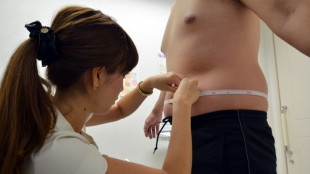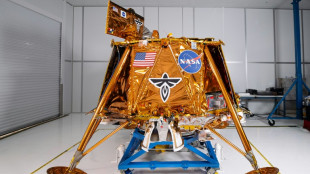
-
 Mitchell leads Cavs over Pacers, Thunder beat 76ers
Mitchell leads Cavs over Pacers, Thunder beat 76ers
-
S. Korea's Yoon: from rising star to historic arrest

-
 Ominous Alcaraz sweeps into Australian Open third round
Ominous Alcaraz sweeps into Australian Open third round
-
'Queen Wen' deposed in huge shock at Australian Open

-
 Vigilante fire clean-up launched by local Los Angeles contractor
Vigilante fire clean-up launched by local Los Angeles contractor
-
Zheng dumped out in huge shock as shaky Sabalenka battles through

-
 Asian equities mixed as US inflation, China data loom
Asian equities mixed as US inflation, China data loom
-
'Queen Wen' Zheng deposed in huge shock at Australian Open

-
 Renewed US trade war threatens China's 'lifeline'
Renewed US trade war threatens China's 'lifeline'
-
China's economy seen slowing further in 2024: AFP survey

-
 Shaky Sabalenka overcomes serve struggles to stay alive in Melbourne
Shaky Sabalenka overcomes serve struggles to stay alive in Melbourne
-
South Korea's six weeks of political chaos

-
 Japan's tourism boom prices out business travellers
Japan's tourism boom prices out business travellers
-
What is the pink stuff coating fire-ravaged Los Angeles?

-
 Mediators make final push for Gaza truce deal
Mediators make final push for Gaza truce deal
-
Musk, Bezos, Zuckerberg to attend Trump inauguration: report

-
 Federal probe begins into deadly Los Angeles fires
Federal probe begins into deadly Los Angeles fires
-
'We may look easy-going, but...' Canadians veto Trump's merger plan

-
 Is obesity a disease? Sometimes but not always, experts decide
Is obesity a disease? Sometimes but not always, experts decide
-
Biden issues land protections after LA fires delay ceremony

-
 Cuba to free over 550 prisoners after removal from US terror list
Cuba to free over 550 prisoners after removal from US terror list
-
Williams, Vine vie for season-opening Tour Down Under crown

-
 Maresca 'concerned' as Chelsea winless run stretches to five games
Maresca 'concerned' as Chelsea winless run stretches to five games
-
'Outstanding' Liverpool deserved more than Forest draw: Slot

-
 Guardiola laments Man City decision-making in Brentford collapse
Guardiola laments Man City decision-making in Brentford collapse
-
Marseille dumped out of French Cup on penalties

-
 Liverpool frustrated by Forest, Man City blow late lead at Brentford
Liverpool frustrated by Forest, Man City blow late lead at Brentford
-
Djokovic, Sabalenka chase history as Australian Open hits round two

-
 Golf star Woods pledges support amid 'unimaginable loss' of LA fires
Golf star Woods pledges support amid 'unimaginable loss' of LA fires
-
Liverpool held by Forest, Man City blow late lead at Brentford

-
 Cuba to free 553 prisoners after removal from US terror list
Cuba to free 553 prisoners after removal from US terror list
-
Leverkusen win to go one point behind Bayern, Kiel down Dortmund

-
 Jota rescues leaders Liverpool in Forest draw
Jota rescues leaders Liverpool in Forest draw
-
Title chasers Atalanta held by Juve, Milan hand Conceicao maiden Serie A win

-
 Man City blow late lead at Brentford, Chelsea held by Bournemouth
Man City blow late lead at Brentford, Chelsea held by Bournemouth
-
Rast charges through on second run to win Flachau slalom

-
 Grimaldo scores as Leverkusen go one point behind Bayern, Dortmund lose
Grimaldo scores as Leverkusen go one point behind Bayern, Dortmund lose
-
Starbucks shift on non-paying visitors stirs debate in US

-
 Clashes as S. Korean investigators attempt to arrest President Yoon
Clashes as S. Korean investigators attempt to arrest President Yoon
-
US, Japanese lunar landers set to launch on single rocket

-
 Boeing 2024 plane deliveries tumble on labor, safety woes
Boeing 2024 plane deliveries tumble on labor, safety woes
-
US removes Cuba from state sponsors of terror list

-
 Argentine annual inflation nosedives, in boost for Milei
Argentine annual inflation nosedives, in boost for Milei
-
S. Korea investigators arrive in new attempt to arrest President Yoon

-
 Pressure builds on Dortmund boss Sahin after loss at Kiel
Pressure builds on Dortmund boss Sahin after loss at Kiel
-
Meta to lay off 3,600 employees in performance-based cuts

-
 Venezuela restricts diplomats from 'hostile' European countries
Venezuela restricts diplomats from 'hostile' European countries
-
Trump's Pentagon pick grilled by senators as cabinet hearings begin

-
 From ban to buyout: What next for TikTok in the US?
From ban to buyout: What next for TikTok in the US?
-
Lazio sack doc who performed far-right falconer's penis op: club owner


Hezbollah chief admits 'unprecedented' blow in device blasts
The leader of Hezbollah acknowledged on Thursday that his group had suffered a "major and unprecedented" blow after thousands of operatives' communication devices exploded across Lebanon in deadly attacks it blamed on Israel.
In his first speech since the attacks, which killed 37 people and wounded nearly 3,000 more across two days, Hassan Nasrallah also struck a defiant tone, vowing that Israel would face a "just punishment".
Even as he delivered his televised address, Israeli warplanes broke the sound barrier over Beirut.
Describing the attacks as a "massacre" and as a possible "act of war", Nasrallah said Israel would face "tough retribution and a just punishment, where it expects it and where it does not".
Israel has not commented on the attacks in which Hezbollah operatives' pagers and walkie-talkies exploded in supermarkets, on streets and at funerals, plunging the country into panic.
But its defence minister, Yoav Gallant, said on Wednesday, in reference to Israel's border with Lebanon: "The centre of gravity is moving northward."
"We are at the start of a new phase in the war," he warned.
Hezbollah is an ally of Palestinian militant group Hamas, which has been fighting a war in Gaza since its October 7 attack on Israel.
For nearly a year, the focus of Israel's firepower has been on Gaza, which is ruled by Hamas.
But its troops have also been engaged in near-daily clashes with Hezbollah militants along its northern border, killing hundreds in Lebanon, most of them fighters, and dozens in Israel.
The exchanges of fire have forced tens of thousands of people on both sides of the border to flee their homes.
Nasrallah vowed to keep up Hezbollah's fight against Israel until a ceasefire in Gaza is reached.
"The Lebanese front will not stop until the aggression on Gaza stops" despite "all this blood spilt," he said.
On Thursday, the Israeli military said it struck six Hezbollah "infrastructure sites" and a weapons storage facility overnight in southern Lebanon, a stronghold of the militant group.
Lebanon's official National News Agency also reported Israeli strikes and shelling on several towns in the south.
The Israeli military said two soldiers were killed near the border with Lebanon.
Hezbollah said 25 of its members had been killed following the explosions, with a source close to the group saying at least 20 had died when their walkie-talkies detonated.
- 'Wider war' -
Lebanon's Foreign Minister Abdallah Bou Habib said the "blatant assault on Lebanon's sovereignty and security" was a dangerous development that could "signal a wider war".
Its prime minister, Najib Mikati, urged the United Nations to oppose Israel's "technological war" on the country, ahead of a UN Security Council meeting on the exploding devices attack.
Iran's envoy to the UN said his country "reserves the right to take retaliatory measures" after its ambassador in Beirut was wounded in the blasts.
The White House, which is pressing to salvage efforts for an elusive ceasefire deal to end the Gaza war, warned all sides against "an escalation of any kind".
"We don't believe that the way to solve where we're at in this crisis is by additional military operations at all," said US National Security Council spokesman John Kirby.
The October 7 attacks that sparked the Gaza war resulted in the deaths of 1,205 people, mostly civilians, on the Israeli side, according to an AFP tally based on official Israeli figures that include hostages killed in captivity.
Out of 251 hostages seized by militants, 97 are still held in Gaza, including 33 the Israeli military says are dead.
Israel's retaliatory military offensive has killed at least 41,272 people in Gaza, most of them civilians, according to data provided by the Hamas-run territory's health ministry. The UN has acknowledged these figures as reliable.
In Gaza on Wednesday, the civil defence agency said an Israeli strike on a school-turned-shelter killed five people. The Israeli military said it targeted Hamas militants.
"What happened in the last two days is so frightening. It's terrifying," Lina Ismail told AFP by phone from the eastern city of Baalbek where some of the explosions occurred.
"We were so scared that we dismantled the inverter (a component inside solar energy systems) and turned off the device," she said.
"I took away my daughter's power bank and we even sleep with our mobile phones in a separate room," she added in a trembling voice.
- 'Sabotaged at source' -
Analysts said operatives had likely planted explosives on the pagers before they were delivered to Hezbollah.
The preliminary findings of a Lebanese investigation found the pagers had been booby-trapped, a security official said.
"Data indicates the devices were pre-programmed to detonate and contained explosive materials planted next to the battery," the official said, requesting anonymity to discuss sensitive matters.
A source close to Hezbollah, asking not to be identified, said the pagers were recently imported and appeared to have been "sabotaged at source".
A government spokesman in Budapest said the company was "a trading intermediary, with no manufacturing or operational site in Hungary".
Japanese firm Icom said it had stopped producing the model of radios reportedly used in Wednesday's blasts in Lebanon around 10 years ago.
burs-ser/dv
M.Ouellet--BTB
